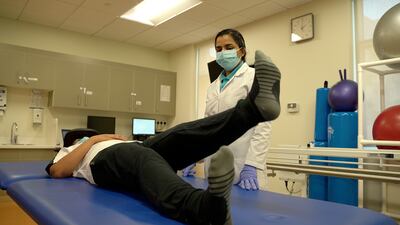A specialist weight-loss clinic for children has been inundated with cases - but is telling parents that there are no quick fixes.
Dieticians at Mushrif Children's Specialty Centre in Abu Dhabi have witnessed a significant rise in demand for obesity treatment since the pandemic began.
Parents typically ask for a gastric band, or even more drastic weight loss procedures, from day one.
"It isn’t magic. Weight loss requires a whole change of lifestyle and requires commitment," said Lina Juny, a senior dietician at the centre run by Seha, Abu Dhabi's public medical care provider.
Mushrif Children's Specialty Centre
Her centre is currently seeing an "overwhelming number of new patients" – about five per day – every day.
The coronavirus has put into sharp focus the risks of being significantly overweight. In the US, research shows that nearly a third of hospital cases – numbering millions – were attributed to obesity.
Ms Juny has seen teenagers as young as 15, with their parents, asking for quick-fix surgery. Some weigh as much as 150 kilograms.
"There are those who put it in their mind that they have to go to surgery and are not enthusiastic about losing weight," she told The National.
"So they will come just to go on to have the operation, even though we try to explain that even if you go for surgery, you have to change your lifestyle. It won't work [without that]. Either way, you will have to change your lifestyle."
________________________________
Foods that shorten your lifespan the most - in pictures
________________________________
Her message about the root cause of weight-gain is simple.
“This is because of a lack of movement, ordering everything online and eating a lot of junk food,” she said.
“Children don’t buy junk food on their own. It is their parents who are in control of their diet and what comes into the house.”
Young people are placed on a diet and exercise programme lasting six months to one year. If no progress is made, doctors may consider surgery for older teens.
“Childhood obesity is often a complex issue with roots in genetic and behavioural mechanisms," she said.
“To tackle the problem, we must analyse the psychological issues that may be underlying the child’s eating habits and promote a healthier lifestyle.
“Any new dietary regimen should not be restrictive or difficult to implement, but rather adaptable to a child’s daily life,” she said.
Matar Al Aryani lost 11 kilogams and reduced his body mass index, a calculation of a person’s body fat based on their height and weight, from 32.11kg/m2 to 27.05kg/m2.
He was enrolled on an intensive weight loss programme from February to June this year.
Staff at the clinic are working on bringing down his weight further.
The number of obese children and adolescents aged five to 19 years worldwide has risen tenfold in the past four decades.
If current trends continue, by 2022 more children and adolescents will be obese than moderately or severely underweight, according to a new study led by Imperial College London and the World Health Organisation.
Al Mushrif's children's speciality centre in Abu Dhabi and Al Towayya in Al Ain are the only two accredited paediatric obesity management centres.












